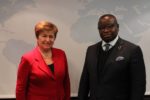Boniface Ihiasota
The World Bank Group has vowed to dedicate the sum of US $325 million to augment its financial support in Sierra Leone. This declaration was made during a meeting held in Washington on Monday 11th March 2019 between His Excellency President Julius Maada Bio and the World Bank Group Interim President Kristalina Georgieva. President Georgieva applauded President Bio for the positive measures has taken so far, which include bold economic reforms, among other measures. She also mentioned that she recognized the President’s aspiration for the dignity of a nation and standing in the world, “President Bio’s agenda will guarantee his legacy and place in history.”
Also present to render his accolades to President Bio was the World Bank Vice President for Africa Region, Hafez Ghanem. “We are impressed with your performance just 10 months in Office. So we are ready to support your government.” He was quoted to have said.
Also in attendance at the meeting were senior management officials from the World Bank including Henry Kerali (Country Director for Sierra Leone), Gayle Martin (Country Manager for Sierra Leone) and Annette Dixon (Vice President for Human Development). High ranking officials from the Government of Sierra Leone present included Professor David Francis (Chief Minister), Dr Moinina David Sengeh (Director, Directorate of Science, Technology and Innovation), Ambassador Sidique Abou-Bakarr Wai (Sierra Leone Ambassador to the US), Patricia Laverley (Deputy Minister of Finance), and Sahr Jusu (Financial Secretary). The Technical teams of both parties will work together to develop a more robust pipeline of transformative projects to admnister in Sierra Leone.
The meeting addressed other issues including increased World Bank Support to Sierra Leone under IDA-18 (US$ 325m); advancement on the new Extended Credit Facility (US$ 172m) under the program with the International Monetary Fund; fiscal consolidation efforts by the Government of Sierra Leone; plans on debt restructuring and arrears clearance (US$ 1.4 billion) and prospects for financing the gap of US$1.5 billion under the country’s new Medium-term National Development Plan (2019–2023).
Expressing his appreciation to the World Bank for the support to his new government and to Sierra Leone as a whole, President Bio stated that the new development paradigm in the country has made way for strategic shifts toward (i) Human Capital Development for national development (ii) Science, Technology and Innovation and (iii) greater Private Sector Participation to address the country’s vast infrastructure needs and support its growth prospects. President Bio also did not fail to mention his resolve to combat corruption in the country. The meeting also adressed Sierra Leone’s new Medium-term National Development Plan (2019–2023) and the strategic alignment with the World Bank’s Country Partnership Framework (CPF).
This increased financial support to President Bio can be describes as timely, as it coincides with his first year anniversary in office and demonstrates the international economic credibility the President has restored in Sierra Leone.
As at the time President Bio resumed office, the International Monetary Fund had already suspended the country’s Extended Credit Facility in 2017 as a result of economic misconduct by the previous government. President Bio has also shown brilliant leadership by investing in Human Capital Development, thereby earning the confidence of donors and the international community.
The meeting finally came to an end with both parties reaching agreements on the following: a World Bank’s support to the energy sector through additional financing for electricity generation, distribution and transmission; a proposed roundtable discussion on Energy in April 2019 during the World Bank/IMF Spring meetings; commitment to rural electrification and solar energy; support to women and girls through women’s empowerment, addressing high maternal mortality, addressing girls education and incentives to keep girls in school and support to reproductive health services; support to the private sector growth; better access to internet; increased budgetary assistance and more support for social safety nets for vulnerable groups, women, youth, and people living with disabilities.









